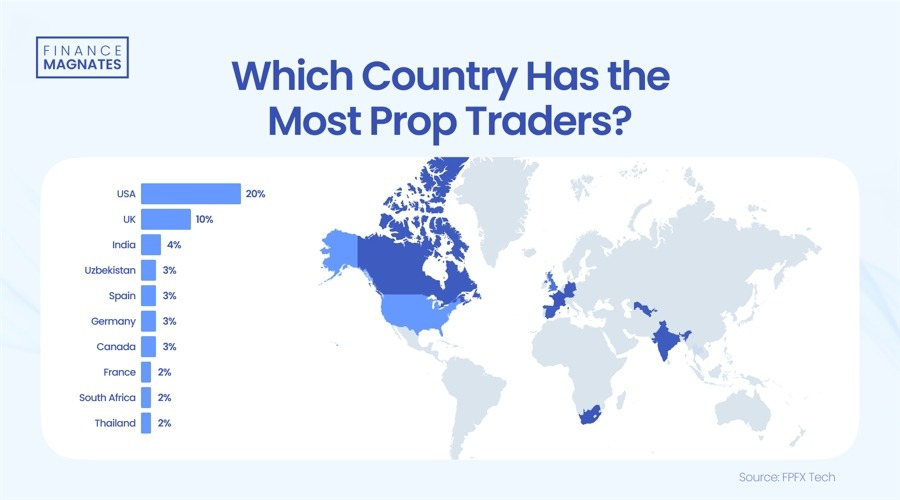“It’s still just the beginning for the Japanese market,” David Varga, co-founder of Fintokei and Purple Trading, told Finance Magnates about the adoption of prop trading, adding that “they are generally very slow at adopting new things from abroad.”
Czech Republic-based Fintokei, which is backed by Purple Trading SC, a contracts for differences (CFDs) broker, entered the prop trading industry by offering services in the Japanese market. Eventually it expanded its global presence beyond Japan and is now focusing on new markets like Australia, Europe, and Southeast Asia. Most of its business is still coming from Japanese traders.
“Japan’s Prop Trading Adoption Is Still Far from Being Massive”
Interestingly, according to Varga, no local Japanese firm offers prop trading services in the country, despite Japan being one of the top markets for retail forex and CFDs trading.
“Our platform is currently the closest to being local,” Varga said, adding: “We have Japanese native-speaking support, we work with local marketing agencies and business partners, we are registered with local authorities, and we even pay taxes in Japan.”
“There are a few companies that, as far as I know, have Japanese websites, but they usually don’t even have proper customer support – it’s either AI or Google Translator or something like that.”
However, Varga is optimistic about the Japanese prop trading market and said that adoption “will probably come because the market is pretty big.” Despite that, he highlighted that “the adoption is still far from being massive.”

“Global Customer Base Is Actually Growing Much Faster than in Japan”
Fintokei currently has more than 20,000 traders on its platform, 60 percent of whom are from Japan. However, Varga pointed out that “the ratio is actually changing since we expanded in Europe and even globally,” adding that “nowadays, the ratio of the global customer base is actually growing much faster than the Japanese one. So, maybe by the end of the year, it will be 50/50 even.”
Furthermore, only seven to eight percent of the total accounts complete the prop trading challenges, thus becoming funded. Out of them, about 16 percent of the funded accounts become profitable and receive payouts. According to Fintokei, it distributed more than €4 million in payouts to traders in 2024.
Notably, the number of accounts on the platform is much higher, as Varga revealed that “traders buy three to four challenges in Japan.”
Addressing the issue of payout rejections by prop trading platforms, Varga said that his platform “hasn’t rejected any.”
“We do have a risk management department, and we monitor all the accounts, even from the evaluation phases,” he continued. “If someone is trading too risky or is so-called gambling, we send them a notification or apply some restrictions, like limiting the leverage or capping their maximum risk or even profit they can make daily.”
“Therefore, we don’t reject payouts when the payout is actually due… as it’s the cornerstone of the whole prop trading business.”
Although prop trading platforms have been around for some time, their popularity has exploded in recent years. FTMO, one of the largest prop trading companies, revealed that it generated $213 million in revenue in 2023. While this figure for Fintokei remains unknown, Varga stressed that prop firms mostly make money from challenge fees, adding that “there are some companies that claim otherwise, but it is hard to say.”
“They All Try to Trade Whatever Is Volatile”
Elaborating on the behavior of Japanese traders, the Fintokei co-founder added: “Japanese traders, in general, are trading more aggressively, especially those looking to trade with offshore brokers because they offer high leverage, so they would be more risk-takers. But when we compare it with prop traders from the Czech Republic or Italy, it’s actually pretty similar, and we can find very good traders on both sides of the world. They all try to trade whatever is volatile, which is mostly gold.”
“In terms of the trading instruments, the Japanese tend to trade much more with JPY pairs. But in terms of overall risk management or behavior, it is not so different from what we would expect.”
However, according to Varga, there is a stark difference between Japanese and European traders when it comes to brokerage customers.
“When you compare a European customer of a broker and then a Japanese customer of another broker, they are very different,” he continued. “How most Japanese people actually perceive trading is more like a free-time activity. Of course, that’s not the case for everyone. There are serious traders there, but a much bigger part of traders are treating it as a fun-time activity or maybe gambling. On the other hand, in the Czech Republic or other European countries, the majority of people who are involved in trading consider it a serious thing. They want to be full-time traders.”
“For brokers, it’s very different, but for prop trading, it seems like it’s attracting a similar type of customer.”

















